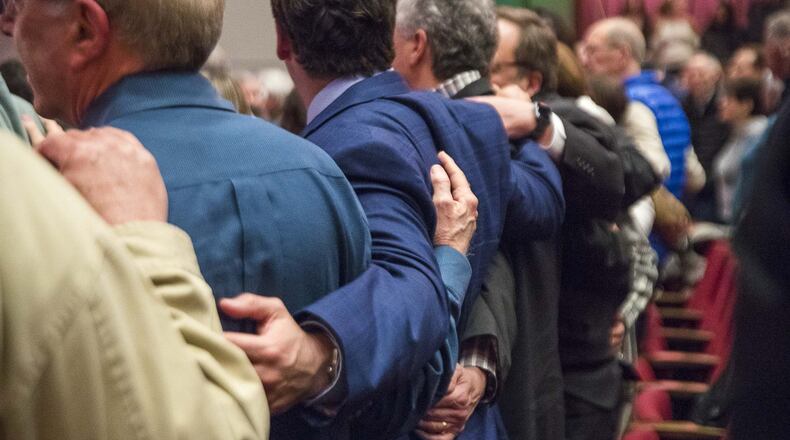Mark Spatt typically doesn’t wear anything that identifies him as Jewish.
The Sandy Springs-based investor considers himself to be more secular than observant.
On Monday, though, as he has for the last week, Spatt proudly wore a white kippah, a small skullcap or head covering worn by some Jewish people as a sign of connection to God.
“As we face continued attack on Jews for being Jewish, it’s more important than ever to show people our pride in our community,” said Spatt. “It’s important to show the unity that is there for our shared ideals and to come together and demonstrate that we’re a strong, committed and historical part of the Atlanta community and the U.S. as a whole.”
Spatt was among members of the metro Jewish community to take part in the #JewishandProud event at Byers Theatre at City Springs in Sandy Springs, where people were asked to wear “your Judaism with pride.” Similar events are being held across the country.
The #JewishandProud initiative follows a string of anti-Semitic incidents in metropolitan New York last month, including an attack that left several people wounded when a machete-wielding assailant stormed a Hanukkah ceremony at a rabbi’s Monsey, New York, home.
Rabbi Ilan D. Feldman of Congregation Beth Jacob Atlanta, has been approached by members concerned about the recent spate of violence.
“I wouldn’t call it panic,” he said. “I wouldn’t call it overt fear. I would call it a heightened sense of concern. Sometimes, people feel a bit intimidated in expressing themselves as Jews because of what they see in the headlines.”
The idea, he said, is to gain strength from each other and to “remind ourselves that we stand for positive values, we stand for love and commitment to a society that works for everyone.”
In 2017, there were 1,986 anti-Semitic incidents reported across the United States, according to the Anti-Defamation League, which has tracked such cases since 1979.
In 2018, that number declined to 1,879 anti-Semitic incidents. That year included the massacre of 11 Jewish worshippers at the Tree of Life Synagogue in Pittsburgh.
Despite the one year decline, anti-Semitic incidents overall in the U.S. doubled from 2015 to 2018, according to the ADL.
Nationally, U.S. Senator Chuck Schumer proposed last week a boost in funding in federal grants for houses of worship to increase security.
Schumer, from New York, called the Hannaukah attack part of a “cascade of violence and intolerance as the state of hate in America has risen to a boiling point that demands a much stronger federal response.”
Atlanta has not been immune from religious-based threats and bias.
In 2017, the Marcus Jewish Community Center of Atlanta in Dunwoody, received a bomb threat, and over the years various metro Atlanta mosques have received threatening emails or letters.
Georgia is also among a handful of states without a law that creates tougher penalties for those who commit crimes against people based on race, religion, sexual orientation or disability.
Dov Wilker, regional director, of the American Jewish Committee, is adamant that nothing will ever silence his Jewish pride; not fear, not bias, not the threat of or actual violence.
His organization is one of several including the Jewish Federation of Greater Atlanta, the American Jewish Committee, the Anti-Defamation League, the Jewish Community Relations Council and the Atlanta Rabbinical Association sponsoring the local pride event.
“We will let the Jewish community know we’re proud, we’re present, we’re strong and we won’t be afraid.”
John Eaves, who is African-American and third-generation Jewish, said understands the feelings many Jews have in wake of the attacks.
“The same hatred that is behind racism is behind anti-Semitism,” said Eaves, former Fulton County Commission chairman who is currently seeking the 7th District Congressional seat. “ … For me, as a Jewish person I can identify with other Jews who are stigmatized because of their faith. I need to speak out and speak out strongly against anti-Semitism.”
The local pride event has drawn support from non-Jews as well.
Sandy Springs Mayor Rusty Paul took to Facebook to encourage others to show their support and express “strong” opposition to anti-Semitism.
Adrienne Penake, a local group leader for Moms Demand Action and the mother of three, said she felt strongly that she should attend #JewishandProud.
Penake, who grew up Catholic, believes hate affects the entire community.
“We have to stand together against hate crimes and violence of any kind,” she said. “To me, it doesn’t matter what your religious background is or your lifestyle preferences. Hate has no place here.”
About the Author
The Latest
Featured

